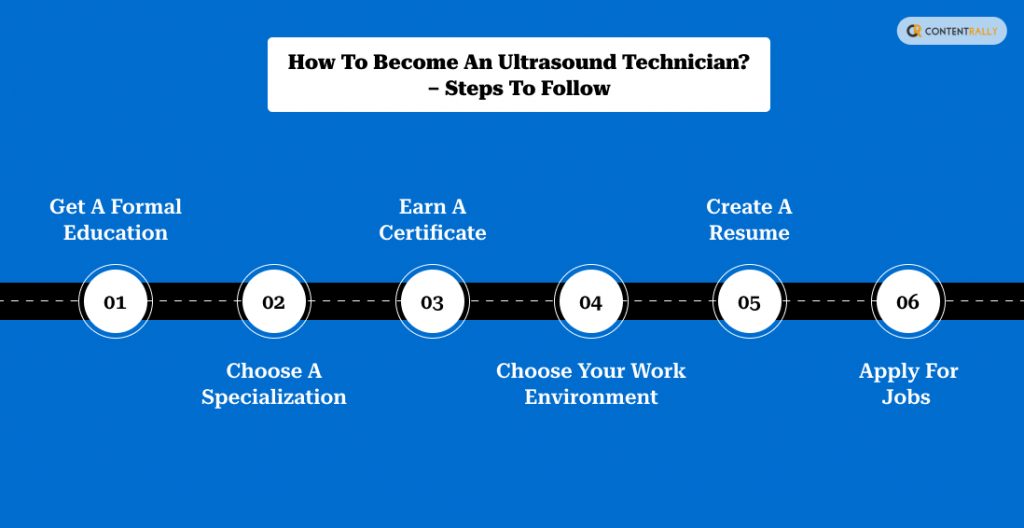How to become an ultrasound technician?
To become an ultrasound technician or medical sonographer, you must at least have an associate degree in sonography.
Moreover, you can also pursue a Diploma or Bachelor’s program. Even if you have a degree in any other healthcare field, you can pursue a degree in sonography.
In this article, you will learn how to become an ultrasound technician or a medical sonographer. Moreover, this article will explain the role of this position.
Apart from that, you will learn the roles, responsibilities, and specializations of an ultrasound technician. Hence, to learn more, read on to the end of the article.
What Is the Job of an Ultrasound Technician?

An ultrasound technician (medical sonographer) helps doctors and other medical professionals diagnose conditions through medical imaging. Here, the medical sonographer ensures that the diagnosis is precise, non-invasive, and pain-free.
For example, an ultrasound technician can help expectant parents see the first images of a child. Generally, these healthcare workers work in teams. Their job includes detecting health conditions like clogged arteries, enlarged spleens, etc., that are potentially life-threatening.
Basically, the ultrasound tech performs sonography by examining different processes of the human body. Apart from that, they check organ functions with the help of the sonography device.
Here, they place a camera-like probe on a patient’s skin. This probe then records images and videos. Then, the ultrasound technician passes the patient data to the physician who ordered the test initially.
Currently, as of 2024, an ultrasound technician is one of the most in-demand jobs.
What Is Sonography?
Sonography uses sound waves to record and create images of a patient’s internal organs. Basically, it is a surface-level recording method that does not use radiation to create images.
Apart from that, some ultrasound technicians perform prenatal ultrasounds. However, you can use and apply sonography in many more ways in healthcare.
For instance, sonography offers you a view of the function of the heart and blood vessels. Also, you can find out whether a patient has potential dysfunctions of abdominal organs.
Hence, if you want to be an ultrasound technician, you must specialize in any one of those areas.
Roles and Responsibilities of an Ultrasound Technician

If you want to work as an ultrasound technician, your task is more than just operating high-tech equipment. Here, you even need to explain various procedures to patients and answer their questions.
For instance, you must operate and maintain different imaging equipment. Additionally, you need to record the patient’s medical data. Moreover, the job also requires you to analyze results before the doctor starts diagnosis.
However, you do not need a medical degree to become an ultrasound technician. Despite that, it is one of the least stressful roles in the medical field. Apart from that, you will also get good pay if you are good at your job. The best part is that the job is in high demand in the medical field.
Generally, in the United States, you will need to work in hospitals as an ultrasound technician. Apart from that, depending on the needs of your employer, you might work in a physician’s office, medical labs, or outpatient care centers.
Basically, in most cases, you will be a part of the team, which consists of doctors, registered nurses, and medical professionals. Furthermore, the ultrasound tech salary ranges from $60,000 to $90,000 annually (approx.)
On the other hand, there are some drawbacks too. This is because, in most cases, you might have to work in an environment with low light. Apart from that, you need to continuously stand and operate the machine. Moreover, in case of high demand, you will need to work on weekends and evenings as well.
How To Become An Ultrasound Technician? – Steps To Follow

You will need approximately two years to become an ultrasound technician. In some cases, you might require a year more.
The following are some steps you must follow to become an ultrasound technician:
1. Get A Formal Education
If you want to become an ultrasound technician, you must receive a degree in the healthcare field. Although it is compulsory to have a degree in medicine, doing so will give you an advantage. Apart from that, you can also consider getting a degree in biology, health sciences, anatomy, and chemistry.
For instance, you can choose to pursue a diagnostic medical imaging course that focuses strongly on sonography. On the other hand, you can also consider pursuing a bachelor’s degree or an associate degree.
2. Choose A Specialization
The healthcare sector is vast, and there are various fields in the sector. Hence, you must choose your specialty beforehand.
For instance, you can choose parental health or other specializations like cardiovascular field, abdominal, breast, neuro, gynecologic, and more. You will get an overview of major specializations in the next section of the article.
Basically, you can specialize in more than one area. After you determine which specialty you prefer more, you can focus on earning proper certifications.
3. Earn A Certificate
To become an ultrasound technician, you have to earn technical certification after you complete your specialization. Generally, there are three recommended ways to complete your certification:
- American Registry for Diagnostic Medical Sonography (ARDMS)
- Cardiovascular Credentialing International (CCI)
- American Registry of Radiologic Technologists (ARRT)
Here, you must choose one of these three since each of them has its own program and course. Any one of these programs will prepare you for a career in sonography.
Moreover, each program has its own requirements and timeline. Also, you need at least a year to complete your certification.
4. Choose Your Work Environment
Once you start working as an ultrasound technician, you will have enough opportunity to choose your work environment. For instance, you can work in a hospital setting, continue your private practice, or work in a medical laboratory.
Therefore, when you are looking for career opportunities, you can search based on the environment where you prefer to work.
5. Create A Resume
After you choose your work environment, you must research your potential employers. Then, you need to choose your work settings and job openings. Once you do that, you must begin working on your resume. Here, you must consider getting some resume tips from a professional.
Here are the factors you must consider when you are building your resume:
📝Formal Education
Here, you must include the name of your school, the degree, and the dates. However, do not include dates if you have graduated more than three years ago. Moreover, you can include details about your experiences with professional organizations and other leadership opportunities.
📝Professional Experience
In this section, you must describe your previous roles and responsibilities. However, if you have just finished school, include positions irrelevant to the healthcare field. Also, consider listing any relevant internship experience or coursework in a similar field.
📝Skills
In the skills section of your resume, highlight your personal and technical abilities. Moreover, to work as an ultrasound technician, here are some professional skills you must mention:
- Communication skills
- Organizational skills
- Attention to detail.
Apart from these skills, list down your skills in sonography and your knowledge of dealing with machines.
📝Certifications
Include relevant certifications and their dates. This will show that you have field knowledge and the professional drive that potential employers are looking for. Moreover, some positions might also require you to have certain certifications.
6. Apply For Jobs
Once you complete your resume, you can apply for jobs in sectors that appeal to you. However, when you are applying for a certain position, make sure to align your resume and cover letter based on the position you are applying for.
Apart from that, you can also consider building a network in the healthcare field. Thereby, you can get insights into hospitals, medical clinics, and healthcare organizations. As a result, you will have more information about openings.
How to Become an Ultrasound Technician? – Major Specializations

An ultrasound technician has exposure to four different sonography specializations. Also, each specialization has multiple sub-specializations.
The following are the major specializations you can choose from:
A. General Sonography
Here, you must know how to image internal organs, like liver, brain, kidneys, etc. The following are the subspecializations in this field:
- Neurosonology
- Obstetric and gynecology sonography
- Abdominal sonography
- Breast sonography
B. Cardiac Sonography
In cardiac sonography, you must specialize in taking images of the heart using echocardiography. The following are some of the major sub-specializations:
- Pediatric echocardiography
- Adult echocardiography
- Fetal echocardiography
C. Vascular Sonography
Here, you must become a specialist in taking images of veins and arteries. Basically, the goal is to look at the flow of blood and the status of blood vessels.
- Peripheral vascular sonography
- Carotid sonography
- Abdominal vascular sonography
D. Musculoskeletal Sonography
In this case, you need to be a specialist in getting images of muscles, tendons, joints, and ligaments.
Here are some sub-specializations you must consider:
- Soft tissue sonography
- Tendon and ligament sonography
- Joint sonography
Pursue A Career In Sonography Now
Hence, you know how to become an ultrasound technician. First, you need to get a formal education in the healthcare field and then work on your specialization. After you specialize, you must get a professional certification. Consequently, you can apply for jobs as an ultrasound technician or a medical sonographer.
Do you have more suggestions on how to become an ultrasound technician? Please share your ideas and opinions in the comments section below.
Read Also:
- What Is a Remote Job? Everything You Need to Know
- How To Become A Certified HVAC Technician In Canada
- 15 High-Paying Careers: Six-Figure Jobs to Consider in 2024
- Pediatrician 101: What You Need To Know Before You Apply To Medical School























